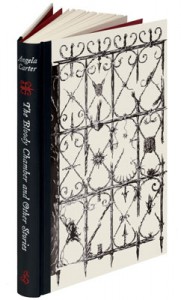After finishing Ruskin’s Stones of Venice, I turned my ‘leisure reading’ eyes to something completely different — albeit a text and author equally indebted to “Gothic” sensibilities of another sort — Angela Carter’s Bloody Chamber & Other Stories (1979). This collection is a ‘post-feminist’ reconfiguring of classic fairy tales, as bloody and lubricious as the originals, but without the problematic gender divisions. I love the fact that Carter, who published her classic and controversial essay The Sadeian Woman in the same year as The Bloody Chamber, ‘updates’ these fantastical stories, adding a dark mirth without sanitizing — indeed, rather reveling in — their chthonic violence.
different — albeit a text and author equally indebted to “Gothic” sensibilities of another sort — Angela Carter’s Bloody Chamber & Other Stories (1979). This collection is a ‘post-feminist’ reconfiguring of classic fairy tales, as bloody and lubricious as the originals, but without the problematic gender divisions. I love the fact that Carter, who published her classic and controversial essay The Sadeian Woman in the same year as The Bloody Chamber, ‘updates’ these fantastical stories, adding a dark mirth without sanitizing — indeed, rather reveling in — their chthonic violence.
My favorite of the nine tales is The Bloody Chamber, a revisioned (and better-written) Dracula in which the heroine’s mother — who in her youth had “outfaced a junkful of Chinese pirates, nursed a village through a visitation of the plague, [and] shot a man-eating tiger with her own hand” — comes riding wildly to the rescue of her daughter (and her daughter’s kind but impotent male ‘protector’), felling her astonished husband — the beast — with one well-aimed rifle shot. The Company of Wolves, which plays on/with the overt sexual innuendo of Little Red Riding Hood, also ends with a dramatic twist to the classic tale: “All the better to eat you with. The girl burst out laughing; she knew she was nobody’s meat. She laughed at him full in the face, she ripped off his shirt for him and flung it in the fire, in the fiery wake of her own discarded clothing. The flames danced like dead souls on Walpurgisnacht and the old bones under the bed set up a terrible clattering but she did not pay them any heed.”
Carter’s prose is perfectly suited to this genre; tight and clean, without Stoker’s indulgence, thereby doing justice not only to the classic fairy tales as retold by the brothers Grimm, but evincing a ‘primitive’ directness that reminds one of Emily Dickinson and the “J” author of Genesis (who, if Harold Bloom is correct, was also a woman). Here is one examples: “The telephone shrilled; for her. Her father. Such news!” Compare J’s beautifully pithy account of the Fall, in Rosenberg’s translation: “To its fruit she reached; ate, gave to her man, there with her, and he ate.”